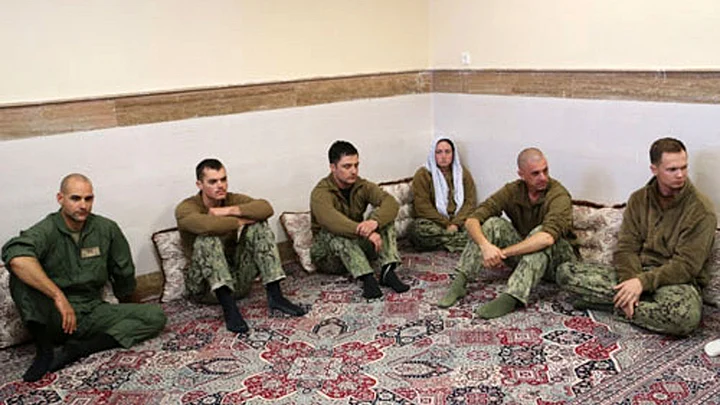Iran’s detention of 10 US sailors on Tuesday set off a furious round of meetings in both Washington and Tehran. Anxious officials in both capitals had the same goal: to ensure the incident did not torpedo a historic nuclear accord between two countries with a long history of hostility.
In the end, it came down to a series of telephone calls between US Secretary of State John Kerry and his Iranian counterpart, Mohammad Javad Zarif, who had forged a close bond during months of tense negotiations on Iran’s nuclear program.
As the Iranian and US governments scrambled for details of the incident, the two men spoke at least five times by phone, US and Iranian officials said. Iran’s Supreme Leader, Ayatollah Ali Khamenei, ordered an immediate investigation to determine whether the US sailors had deliberately sailed into Iranian waters, and ultimately had the final say in their release, Iranian officials said.
High-level gatherings in Washington were mirrored in Tehran, where top security and government officials held at least three meetings. Iranian President Hassan Rouhani attended the sessions, one Iranian official told Reuters.
The drama in the Gulf, which the USgovernment had initially hoped to keep under wraps, became public knowledge just hours before President Barack Obama was due to give his annual State of the Union address in the Congress.
Kerry learned of the detention of the sailors in their two small craft at 12:30 p.m. EST (1730 GMT), as he and Defense Secretary Ash Carter met with their Filipino counterparts on the State Department’s eighth floor.
Kerry almost immediately excused himself and went to his seventh floor office. As it happened, he already had a call scheduled with Zarif at about 12.45 EST.
Appealing for the sailors’ quick release, Kerry told Zarif: “We can make this into what will be a good story for both of us,” according to a senior State Department official. He repeated that message in follow-up calls, the official said.
Looming large was the nuclear deal, which both men have invested so much in and striven to protect. In Washington, the deal has come under sustained attack from majority Republicans in Congress who have accused Obama of weakness and say the Iranians are not to be trusted.
In Tehran, the stakes were no less high. Formal implementation of the nuclear deal is expected to begin within days, giving Iran billions of dollars in relief from economic sanctions in return for curbs on its nuclear activities.
Iranian officialThere were some concerns, including political and military consequences of the issue, and the government officials were also worried about its affect on the nuclear deal and its implementation.
Supreme Leader Khamenei “underlined the importance of showing Islamic clemency and good behavior to the detained soldiers, especially to the female sailor,” the second official said.
“After making sure there were no evil intentions from the sailors’ side, Leader Khamenei gave the green light for the release of sailors,” the official said.
In an Iranian television interview, one of the sailors apologised and said the boats had mistakenly entered Iranian waters. The sailors were released from Farsi Island on Wednesday. US officials said they were unharmed, and that they had made no government-to-government apology to Tehran.
The breakthrough call between Zarif and Kerry came around 3:15 pm.
“At that point,” the senior State Department official said, “Foreign Minister Zarif said to the secretary that he had indications from the people who were holding our sailors that they would be free to go at dawn, that it was probably not safe for them to transit during the course of the night in dark.”
(At The Quint, we question everything. Play an active role in shaping our journalism by becoming a member today.)
